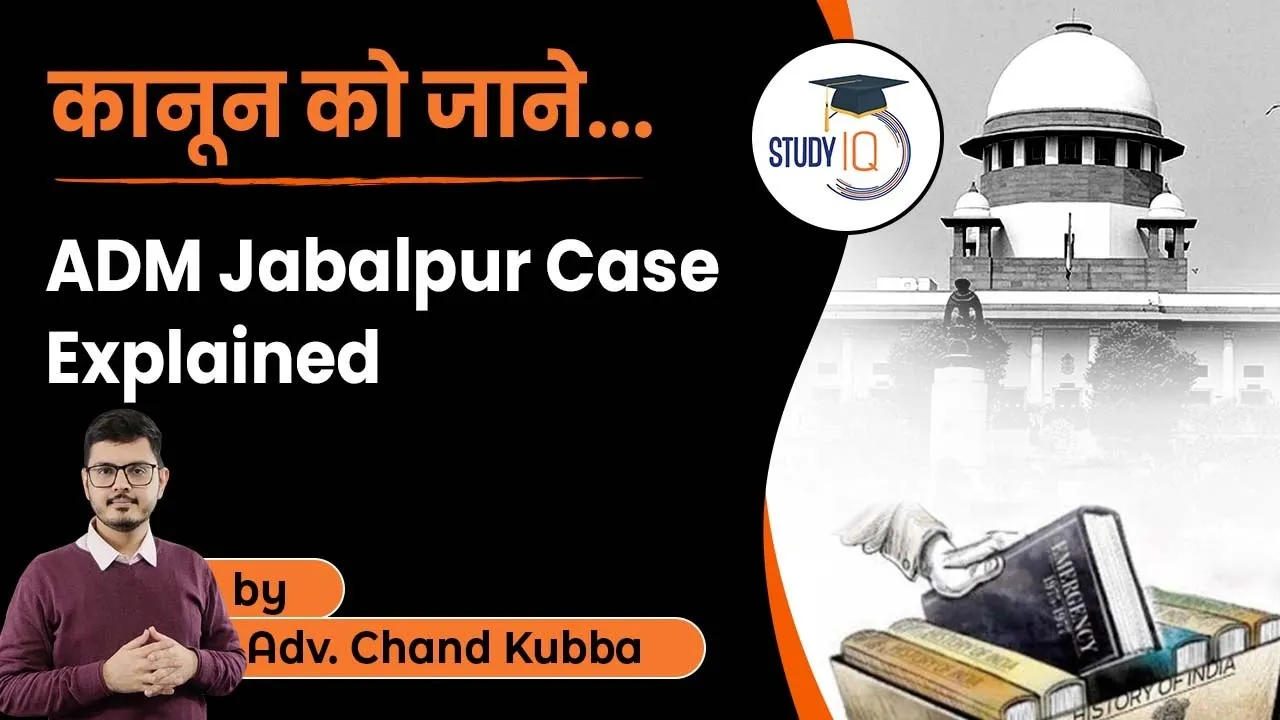Table of Contents
ADM Jabalpur Case
Background-
State of Uttar Pradesh v. Raj Narain
- Raj Narain, who had been defeated in the 1971 parliamentary election by Indira Gandhi, lodged cases of election fraud and use of state machinery for election purposes against her in the Allahabad High Court, under the provisions of Representation of Peoples Act 1951
- On 12 June 1975, Allahabad High Court found the prime minister guilty on the charge of misuse of government machinery for her election campaign.
- The court declared her election null and void she lost her from her seat in the Lok Sabha.
- The court also banned her from contesting any election for an additional six years.
- She filed for an Appeal in Supreme Court.
- 25th June 1975- Jayaprakash Narayan organised a large rally in Delhi, where he appealed police officers to reject the orders of government if the order was immoral and unethical
- Such a statement was taken as a sign of inciting rebellion in the country.
- Later in the day Emergency was declared in India by President of India- Fakhruddin Ali Ahmad under Article 352 on the grounds of Internal Disturbance.
- Within next few hours restrictions started pouring in and the electricity to all major newspapers was cut and the political opposition arrested.
- Moreover, an order was also issued by the President under Acrticle 359 (1) that Fundamental Rights, including the rightsunder Article 14, 21 and 22 would be not be enforceable , i.e. No one would be able to approach Supreme Court or High Court to enforce their FRs.
- Article 359-Suspension of the Enforcement of Fundamental Rights during emergencies
- As per Article 359of the Constitution, upon the Proclamation of Emergency by the President, an order may be made by the President that all the fundamental rights become
- It effectively means that NO writ of Habeas corpus would be maintainable for any of the detention.
- At that time major act that was used to detain people was MISA Act of 1971.
- Maintenance of Internal Security Act gave over encompassing powers to the Government. People could be detained even without conducting a trial under the Act
- People detained under MISA approached the various High Courts across the country challenging the provisions of Article 359 and claiming that their Rights under Article 21 and 22 were being infringed .
- Writs of Habeas Corpus were filed under Article 226 and many of the got relief.
- It was held by at least 9 High Courts that the writ of Habeas Corpus was maintainable even during emergency.
- Ultimately this matter went to the Supreme Court in the form of ADM Jabalpur vs. Shivkant Shukla, where in Government challenged the relief given to various detainees by various High Courts.
- Government argued that the High Court can’t provide relief to the petitioners when the orders under Article 359 were in force.
- This case was decided by a Constitution bench where in the judgement was given by majority of 4:1
- The majority judgement given by Chief Justice A.N. Ray, Justice M. H. Beg, Justice P.N. Bhagwati and Justice Y.V. Chandrachud held that “In period of public danger or apprehension the protective law which gives every man security and confidence in times of tranquility has to give way to interests of the State.” It was also stated that “Liberty is itself the gift of the law and may by the law be forfeited or abridged,” when the question about the status of Article 21 was raised.
The dissenting judge – Justice HR Khanna held that-
- “Sanctity of life and liberty was not something new when the Constitution was drafted…the principle that no one shall be deprived of his life and liberty without the authority of law was not the gift of the It was a necessary corollary of the concept relating to the sanctity of life and liberty; it existed and was in force before the coming into force of the Constitution. The idea about the sanctity of life and liberty as well as the principle that no one shall be deprived of his life and liberty without the authority of law are essentially two facets of the same concept.”
Fortunately K.S. Puttaswamy v. UOI (AIR 2017 SC 4161) overruled the decision of ADM Jabalpur.
- “No civilized state can contemplate an encroachment upon life and personal liberty without the authority of law. Neither life nor liberty are bounties conferred by the state nor does the Constitution create these rights. The right to life has existed even before the advent of the Constitution. In recognising the right, the Constitution does not become the sole repository of the right.”






















 WhatsApp
WhatsApp